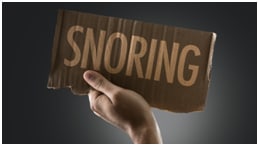It’s Just Snoring!” Right?
“I first got diagnosed with sleep apnea/snoring in 2008 and have been dealing with it ever since. I have tried online quick fixes, CPAP machines and surgery, but nothing has worked to effectively get rid of my snoring completely until now. I went to see my dentist and he explained to me in simple terms how my sleep was being affected by the development of my jaws and how he could provide alternatives to help eliminate my snoring. There was NO pressure and all my options were explained in great detail! I was fitted for a dental guard to help eliminate my snoring in two simple sittings. Now I sleep better, and my wife is no longer hitting me multiple times throughout the night because I'm keeping her up! It couldn't have been a more straightforward and easy process! I certainly wish I found my sleep dentist 12 years ago!”
People who eventually get treated by the right sleep dentist Tweet
The above quote is a rather typical review from people who eventually get treated by the right sleep dentist.
What is also typical is the underlying reason someone may have to search for 12 years to find a solution for their snoring! So many people are desperate to find snoring solutions. And when you get to the root of why they are searching for a solution, you inevitably find that it is to get back into the bedroom with their spouse (or to get back into the good graces of their spouse).

A 2017 survey by the National Sleep Foundation showed that almost one in four married couples slept in separate beds. Yes, you read that right. Almost one in four. There were many reasons for this stated in the survey, but among the most common was snoring, as you could have probably guessed. Especially if you are reading this chapter as a victim of secondhand sleep deprivation due to a partner’s snoring.
For many of those partners who have yet to be asked to leave the bedroom, you may suffer from bruised rib syndrome. Beware, it may be the ribs or the opposing elbows causing the damage that could eventually lead to the exit. In either case, nobody prefers to bring snoring into a relationship.
While dentists are not marriage counselors, sleep dentists do find themselves intervening in relationships every day.
There’s one dental sleep colleague who happens to be married to a marriage counselor and he always says “My wife’s job is to keep couples in the same house, and my job is to keep them in the same bedroom.” What is it that keeps someone on a journey for 12 years to fix a problem that often doesn’t “bother” him or her personally? What leads a person like the one who wrote the review above to continue looking for solutions even when surgery failed? The answers to these questions happen to be one reason you might consider snoring somewhat of a blessing. Seeing what spouses will do for each other is a blessing in and of itself.
But the real blessing of this obnoxious situation is that our body is giving us an audible clue of an underlying problem. A clue that is tough to miss if we just have someone listen to us. As much as sleep dentists enjoy helping couples with their relationships, it takes a back seat to helping people improve their health and wellness.
With our health in general, many devastating problems go unnoticed until it is far too late. Take high blood pressure for example. Many people don’t know they have had a long-term problem until they are hit with a major heart attack. Think about cancer. Without routine exams, cancer often goes undetected until it has spread so much that there are limited treatments and often a very poor prognosis.
Once a pain point has occurred in these other situations, many times the problems have done so much damage that the chances of returning to normal are minimal. Fortunately, in the realm of sleep-breathing disorders we often have clues to catch things early. Yes snoring, as ugly as it sounds, can be one of these obvious clues.
All we must do is listen and choose to act. In his book, “Sleep Interrupted”, Dr. Steven Park gives the following statistics: “It’s estimated that about 20% of men and 5% of women in their thirties snore, but these figures rise to 60% of men and 40% women in their sixties. About 35% of habitual snorers are estimated to have obstructive sleep apnea. However, of most concern is the fact that about 80-90% of people with obstructive sleep apnea are not diagnosed, implying that a significant number of snorers have undiagnosed obstructive sleep apnea.”
This simply shows that if you or a loved one are suffering from snoring—you are not alone! As we have discussed in this book, snoring sits on a continuum of breathing issues and can be a sign of more detrimental things occurring, or even signs of things to come.
Increasingly, research shows that there is an elevated chance of stroke associated with snoring alone. That means that we can no longer ignore this common problem.

So, while many consider snoring a curse, let’s reframe that thought. Let’s consider it a blessing. It’s a chance to catch a major health problem before it’s too late…before our relationships, or even worse, our lives, are affected. Let’s also consider that it is a blessing that the treatment for snoring can be so simple.
In the next chapter we’ll discuss more about the affect snoring (and sleep apnea) has on your bed partner.

